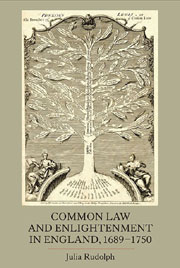Book contents
- Frontmatter
- Contents
- Acknowledgements
- Abbreviations
- 1 Against Decline
- 2 Law Books, Legal Knowledge and Enlightened Encyclopedism
- 3 Expertise and Evidentiary Practices in Science and Law
- 4 Common Law, Credit and the Growth of Commerce
- 5 Common Law Jurisprudence and the Philosophy of Natural Law
- 6 Common Law and the Morality of Markets
- 7 Legal Histories and Enlightened Historiography
- Conclusion
- Bibliography
- Index
- STUDIES IN EARLY MODERN CULTURAL, POLITICAL AND SOCIAL HISTORY
5 - Common Law Jurisprudence and the Philosophy of Natural Law
Published online by Cambridge University Press: 05 May 2013
- Frontmatter
- Contents
- Acknowledgements
- Abbreviations
- 1 Against Decline
- 2 Law Books, Legal Knowledge and Enlightened Encyclopedism
- 3 Expertise and Evidentiary Practices in Science and Law
- 4 Common Law, Credit and the Growth of Commerce
- 5 Common Law Jurisprudence and the Philosophy of Natural Law
- 6 Common Law and the Morality of Markets
- 7 Legal Histories and Enlightened Historiography
- Conclusion
- Bibliography
- Index
- STUDIES IN EARLY MODERN CULTURAL, POLITICAL AND SOCIAL HISTORY
Summary
In eighteenth-century England ideas about natural law also developed within the context of controversy over the jurisdiction of common law and equity. In the course of these controversies natural law jurisprudence and common law jurisprudence evolved in conjunction with other philosophical trends. English legal theorists drew upon a variety of philosophical positions – ‘religious’ as well as ‘secular’, ‘social’ as well as ‘individualist’ – providing further evidence for Frederick Beiser's claim that ‘the natural law theory of the Enlightenment’ encompassed ‘different, even competing traditions’. Moreover, the evidence derived from these debates about the jurisdiction of common law and equity demonstrates that arguments from natural law did not simply supplant or supersede common law arguments for the authority of prescription and precedent. If the previous chapters primarily argued against the image of common law jurisprudence as static in the eighteenth century, this chapter further challenges perceptions of the irrelevance of common law jurisprudence within this period of Enlightenment ‘natural law fervour’.
Natural law jurisprudence was not the only jurisprudence. Nor was natural law simply a veneer, superimposed upon but not integrated with common law doctrines and ideas. Indeed David Ibbetson has shown that the attraction to natural law actually affected the formulation of substantive common law doctrines; he demonstrates the significant influence of natural law on the development of trusts, contracts, unjust enrichment and torts. These four areas of English law are also, unsurprisingly, all areas of jurisdictional dispute between common law and equity in this period.
- Type
- Chapter
- Information
- Common Law and Enlightenment in England, 1689-1750 , pp. 164 - 200Publisher: Boydell & BrewerPrint publication year: 2013

